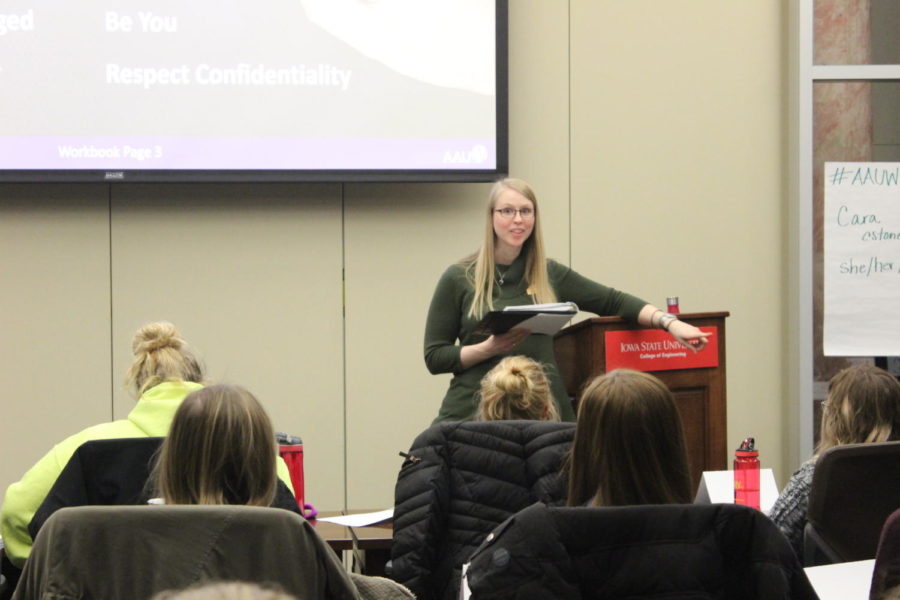A Seat at the Table: Iowa State Women Mentored by Women Faculty to Negotiate Wages
Facilitator Cara Stone leads the discussion on salary negotiation strategies.
February 7, 2018
According to a Levo league survey, 59 percent of millennials didn’t negotiate for any part of their compensation in their current job, and 79 percent didn’t negotiate their offers in their first jobs out of school.
Female Iowa State students are being taught the skills needed to be self-advocates by women faculty accepting the challenge to empower students entering the workforce.
On Jan. 31, the Margaret Sloss Women’s Center and the Program for Women in Science and Engineering (WISE) collaborated to bring Iowa State students the opportunity to work through the job negotiation barriers they face.
A certified American Association of University Women event, the AAUW Start Smart Workshop was facilitated by Iowa State Instruction Librarian Cara Stone. Stone led attendees through mock negotiation scenarios and addressed raised concerns by Iowa State women concerned for their professional careers. Women on faculty shared their own experiences and offered tips of advice in response to students’ concerns.
One problem that was addressed throughout the room from the female student body was their apprehension at being viewed as too assertive when negotiating their salaries. These concerns were addressed by Stone and women in the audience who had experienced their own salary negotiations.
Assistant Director of the Women’s Center Som Mongtin said she believed “I should feel grateful that I got a job” when she was employed for the first time. This idea is what many women attendees said hold them back from negotiating in addition to lacking negotiating skills.
Director of Career Services Taren Crow said a good place to start in negotiating is to “always be gracious, very polite about any offer.” She said many students don’t understand that a job offer is more than a salary.
For that reason, Crow and the Liberal Arts and Sciences Career Services try to get in front of as many students as they can. Seeing around 1,000 appointments a year, they are an on campus resource which can help students with preparing for an interview and evaluating and negotiating a job offer.
Crow said students are also not the only ones questioning what a fair salary is. Employers who reach out to LAS Career Services are expecting negotiations to occur and may even be apprehensive if interviewees don’t negotiate.
“If you have questions and they’re insightful questions, that shows me that you are invested. It shows me that you’ve done your homework and that you’re capable of digging a little deeper,” said Stone.
Ruxandra Looft, workshop attendee and advising coordinator and lecturer in world languages and cultures, went both as an adviser to students and for herself.
From her own experiences of trial and error, she explained it is inevitable that you get both yes’s and no’s, but it is crucial to “not letting yourself just be shut down without asking for an explanation.” Identifying other women who are doing things you would like to be doing is another of her go-to pieces of advice.
Loft also said mentors play a big role in professional success, whether or not they are a man or a woman.
“Those who identify in different ways are always welcome to the table,” Stone said. “I can help amplify your voice so that you are rising in the profession and we’re lifting each other up and growing as professionals together, despite working in different disciplines.”
















